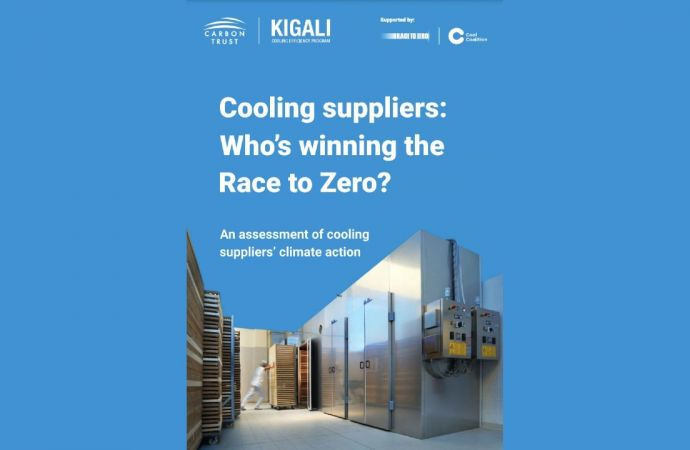The UK Department of Energy and Climate Change (DECC) has recently launched a study, which assessed the environmental impacts of refrigerant leakage in heat pumps. The report concluded that in view of the increased deployment of heat pumps in the UK, the emissions related to the refrigerant are set to become increasingly important. In the long-term it is therefore recommended to incentivise the use of low GWP refrigerants, such as hydrocarbons and CO2.

With the Renewable Heat Incentive (RHI) running for non-domestic heat pumps since 2011 and recently launched for the domestic sector, the deployment of heat pumps in the UK is projected to grow significantly. In order to assess the impact of emissions from refrigerants in heat pumps between now and 2050, the UK Department of Energy and Climate Change (DECC) has commissioned a report “Impacts of Leakage from Refrigerants in Heat Pumps”, prepared by Eunomia with support from the London South Bank University’s Centre for Air Conditioning and Refrigeration Research.
The analysis suggests that trying to reduce the level of leakage in the short-term whilst incentivising low-GWP refrigerants in the longer term would be the most appropriate way to maximise the benefits associated with heat pump technologies.
Impact of refrigerant becoming more important as heat pump sector grows
If the large-scale deployment of heat pumps comes to fruition, the energy performance and displacement of existing fossil fuel heating technologies will have a significant impact on the ability of heat pumps to contribute to carbon reduction targets. As a result, the GHG emissions associated with refrigerant use will be increasingly important as deployment of heat pumps grows.
While the analysis suggests that refrigerant leakage will not have a significant impact on the potential CO2 benefits of heat pumps, it also highlights that this would be especially due to the shift to low-GWP refrigerants.
Annual leakage rates (3.8% for non-domestic applications and 3.5% for domestic applications) were determined from analysis of f-gas log books. The report highlights that the log books were generally of poor quality, which led to uncertainty within the modelling.
Report estimates the likely trends in refrigerant use
The negative impact associated with refrigerant leakage in heat pumps is calculated to be 46,000 tCO2eq by 2050/51, compared to 128,000 tCO2eq in 2020/21 (excluding air to air heat pumps). It is estimated that the maximum negative impact attributed to refrigerant leakage will occur in 2025/26 at 212,000 tCO2eq. The shift from HFCs towards natural refrigerants, such as hydrocarbons and CO2, will therefore have a substantial impact on emissions reduction between 2020 and 2050.
According to the report, the EU F-Gas Regulation (and its possible future updates), which imposes restrictions on the use of certain refrigerants, will be the major driver in moving towards low-GWP refrigerants.
Whilst it is difficult to identify future market share of refrigerants in heat pumps, the study provides estimations of the future refrigerant mix. In 2015/16, HFC refrigerants are assessed to take up around 95% of the refrigerant market share in new heat pumps, with their portion gradually declining over the next 30 years and being completely replaced by low GWP natural refrigerants and unsaturated HFCs by 2050/51. By this time, CO2 and hydrocarbons are estimated to constitute 25% and 50% of the market share in the heat pump sector, respectively.
Background
The report focuses on the impact of air to water heat pumps (AWHPs), ground source heat pumps (GSHPs), and exhaust source heat pumps. The impact of a much larger number of existing air to air heat pumps (AAHPs) is also investigated.
The analysis is based on the modelling of the total heat pump deployment (under our central scenario) to reach around 430,000 installations by 2020 (excluding AAHPs) and 2,700,000 installations when AAHPs are included.
The analysis suggests that trying to reduce the level of leakage in the short-term whilst incentivising low-GWP refrigerants in the longer term would be the most appropriate way to maximise the benefits associated with heat pump technologies.
Impact of refrigerant becoming more important as heat pump sector grows
If the large-scale deployment of heat pumps comes to fruition, the energy performance and displacement of existing fossil fuel heating technologies will have a significant impact on the ability of heat pumps to contribute to carbon reduction targets. As a result, the GHG emissions associated with refrigerant use will be increasingly important as deployment of heat pumps grows.
While the analysis suggests that refrigerant leakage will not have a significant impact on the potential CO2 benefits of heat pumps, it also highlights that this would be especially due to the shift to low-GWP refrigerants.
Annual leakage rates (3.8% for non-domestic applications and 3.5% for domestic applications) were determined from analysis of f-gas log books. The report highlights that the log books were generally of poor quality, which led to uncertainty within the modelling.
Report estimates the likely trends in refrigerant use
The negative impact associated with refrigerant leakage in heat pumps is calculated to be 46,000 tCO2eq by 2050/51, compared to 128,000 tCO2eq in 2020/21 (excluding air to air heat pumps). It is estimated that the maximum negative impact attributed to refrigerant leakage will occur in 2025/26 at 212,000 tCO2eq. The shift from HFCs towards natural refrigerants, such as hydrocarbons and CO2, will therefore have a substantial impact on emissions reduction between 2020 and 2050.
According to the report, the EU F-Gas Regulation (and its possible future updates), which imposes restrictions on the use of certain refrigerants, will be the major driver in moving towards low-GWP refrigerants.
Whilst it is difficult to identify future market share of refrigerants in heat pumps, the study provides estimations of the future refrigerant mix. In 2015/16, HFC refrigerants are assessed to take up around 95% of the refrigerant market share in new heat pumps, with their portion gradually declining over the next 30 years and being completely replaced by low GWP natural refrigerants and unsaturated HFCs by 2050/51. By this time, CO2 and hydrocarbons are estimated to constitute 25% and 50% of the market share in the heat pump sector, respectively.
Background
The report focuses on the impact of air to water heat pumps (AWHPs), ground source heat pumps (GSHPs), and exhaust source heat pumps. The impact of a much larger number of existing air to air heat pumps (AAHPs) is also investigated.
The analysis is based on the modelling of the total heat pump deployment (under our central scenario) to reach around 430,000 installations by 2020 (excluding AAHPs) and 2,700,000 installations when AAHPs are included.
MORE INFORMATION
Related stories



